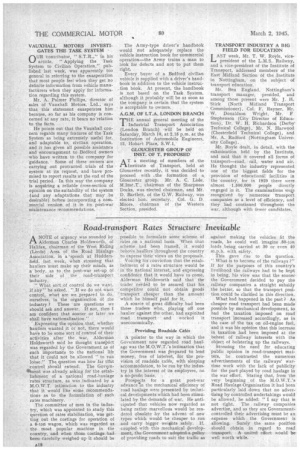Road-transport Rates Structure Inevitable A NOTE of urgency was sounded
Page 20

If you've noticed an error in this article please click here to report it so we can fix it.
by .1-1 Alderman Charles Holdsi,vorth, of Halifax, .chairman of the West Riding (Leeds) Area of the Road Haulage Association, in a -speech at Haddersfield, last week„ When' stressing that hauliers 'must make up their minds, as a body, as to the post-war set-up of their side of the road-transport industry.
" What sort..of control do we want, E any he aiked. " If we do not Want control, what are we prepared to 'clO, ourselves, in the organization Of ,the industry ? These are questions we should ask and' answer. If not, thenI am Confident that sooner, or later we shall have nationalization."
:Expressing the opinion that, whether hauliers wanted it or not,. there would have to be some 'sort of control 'of their activities alter' the -War, Alderman Holdsworth said he thought transpart was regarded by the Government as of such importance .to the national life that it could not be allowed " to run Iciase.7 The question was how far tlIat Control should extend. . The Gove.rn*Dent was already asking for the estab.1ishment of a national road-haulage rates structure, as 'was indicated by a M.O.W.T. intimation to the industry that it would like sOme recommendations as to the 'formulation of such rates machinery.
The committee of men in the industry, which was appointed to study this question of rates' stabilization, was getting out the coatings for operation of a 6-ton wagon, which was regarded as • the most popular ,machine in the country, and when those. costingshad beew carefully weighed. up it should be
possible :ta forinulate some scheme of rhtes .on. a .national basis. When that .scheme had been framed, it would behove hauliers throughout the country to express their views on the proposals.
Voicing his 'conviction that the establishment of a rates structure would be in the national interest, and expressing confidence that it would have to come, Alderman ffoldsworth said that the trader. needed to be assured that his competitor could not obtain goods 'transport cheaper than the amount 'which he himself paid for it.
A source of great difficulty had been those traders who, playing off one haulier against the other, had exploited road transport and worked it uneconomically.
Providing Roadside Cafes
• -A pointer to the way in which the Government now regarded road haul: age was the M.O.W.T.'s intimation that the Government was prepared to lend money, free of interest, for the provision of roadside cafes, with sleeping acCommoclation, to be run by the industry in the interest of its employees, on a no-profit basis.
Prospects for a great post-war advance in the mechanical efficiency of road haulage were presented by technical developments which had been stimulated by the demands of war. He anticipated that vehicles now regarded as being rather .marvellous would' be rendered obsolete by the advent of new types which would be cheaper to run and carry bigger weights safely. If, coupled• with this mechanical ..developmerit, the-Government adopted.a.polioy of providing roads to suit the traffic as
against making the vehicles fit the roads, he could well imagine 50-ton loads being carried at 90 or even 40 m.p.h. with safety.
This gave rise to the question, " What is to become of the railways ?" If for the purposes of this country's livelihood the railways had to be kept in being. his view was that the sooner. the Government decided to pay the railway companies. a straight subsidy the better, so that the transport position could be clarified in this direction.
What had happened in the past ? As cheaper road transport had been made possible by mechanical development, So had the taxation imposed on road transport -increased accordingly, as in the case of the tax on oil-engine fuel, and it was his opinion that this increase in taxation had been imposed at the :behest of 'railway interests with the object of bolstering up the railways.
Stressing the need for educating public opinion in road-transport matters, he contrasted the numerous advertisements of the railways' wartime work with the laCk of publicity for the part played byroad haulage in the war effort. Stating that, from -the very beginning of the M.O.W.T.'s Road Haulage Organization it had been particularly laid down that no advertising by controlled undertakings would be allowed, he added: " I say that is not right. The railway companies advertise, and as they are Governmentcontrolled their advertising must be an expense which the Government is allowing. Surely the same position should obtain • in regard to road -transport. A united effort would be well worth while.




















































